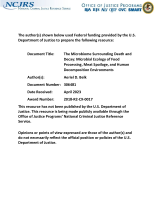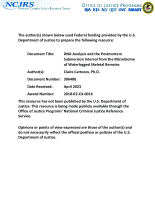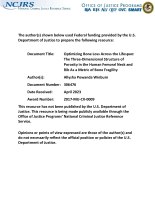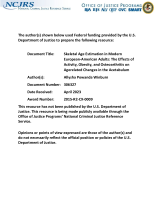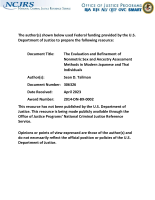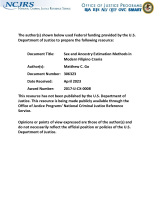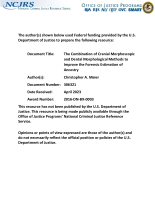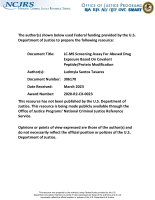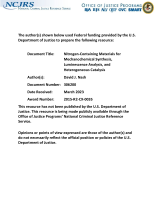Fellowship Programs
Blunt force trauma to the ribs: Creating predictive models
The Microbiome Surrounding Death and Decay: Microbial Ecology of Food Processing, Meat Spoilage, and Human Decomposition Environments
DNA Analysis and the Postmortem Submersion Interval from the Microbiome of Waterlogged Skeletal Remains
Optimizing Bone Loss Across the Lifespan: The Three-Dimensional Structure of Porosity in the Human Femoral Neck and Rib As a Metric of Bone Fragility
Investigation of Ionic Liquid Phases for Chromatographic Separation of Fentanyl Analogues
It's a Marathon Not a Race: Exiting the Commercial Sex Trade
Vibrational Spectroscopy: The New Horizon for Gunshot Residue Analysis (Chapter 2 of Forensic Analysis of Gunshot Residue, 3D-Printed Firearms, and Gunshot Injuries: Current Research and Future Perspectives)
Rate of onset of dopamine transporter inhibitors assessed with intracranial self-stimulation and in vivo dopamine photometry in rats
A Transdisciplinary Approach for Generating Synthetic but Realistic Domestic Sex Trafficking Networks
Secure Multi-Robot Systems: Threat Identification and Countermeasure Development
Genomic Analysis of Pollen Grains for Forensic Applications
Behavioral Screening and Chiral Bioanalysis of Emerging Stimulant-Type Drugs in Rats
Skeletal Age Estimation in Modern European-American Adults: The Effects of Activity, Obesity, and Osteoarthritis on Age Related Changes in the Acetabulum
The Evaluation and Refinement of Nonmetric Sex and Ancestry Assessment Methods in Modern Japanese and Thai Individuals
Identification of Deceased Border Crossers: Investigating Spatial and Skeletal Attributes of Migrant Deaths
Sex and Ancestry Estimation Methods in Modern Filipino Crania
The Combination of Cranial Morphoscopic and Dental Morphological Methods to Improve the Forensic Estimation of Ancestry
LC-MS Screening Assay For Abused Drug Exposure Based On Covalent Peptide/Protein Modification
Multi-period Max Flow Network Interdiction with Restructuring for Disrupting Domestic Sex Trafficking Networks
Nitrogen-Containing Materials for Mechanochemical Synthesis, Luminescence Analysis, and Heterogeneous Catalysis
Improving Human Identification Using the Human Skin Microbiome
Image Analytics and Artificial Intelligence Architectures for Medical and Forensic Applications
A Leg Up: NIJ's Graduate Research Fellowship Program
A Leg Up: NIJ's Graduate Research Fellowship Program
NIJ Director Dr. Nancy La Vigne joins the show to interview Dr. Marie Garcia, Director of NIJ’s Criminal Justice Systems Division and a former NIJ graduate research fellow. They discuss the application process, Marie’s experience as a fellow while at Temple University, and advice for future applicants.
Reading and Resources from NIJ:



